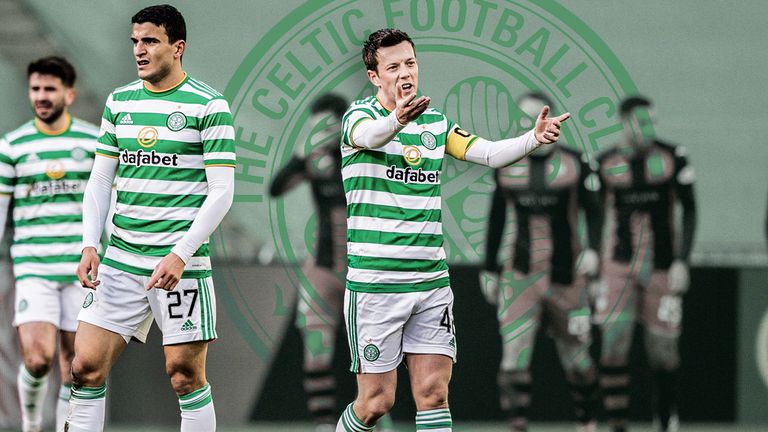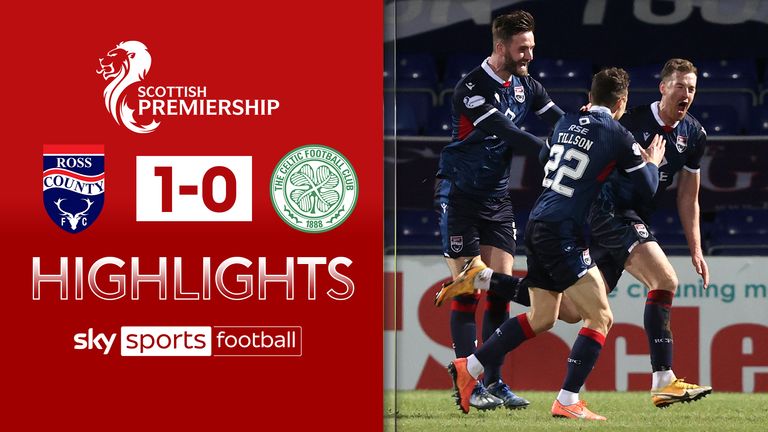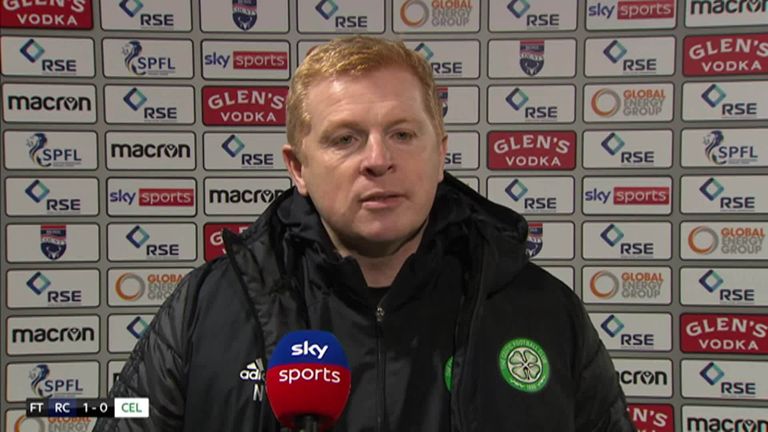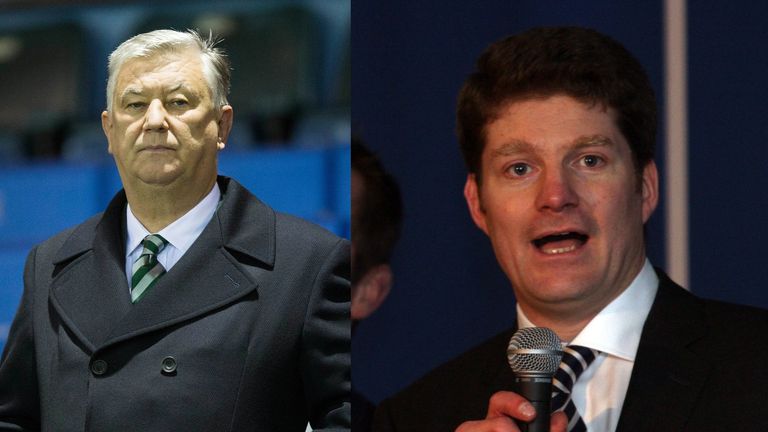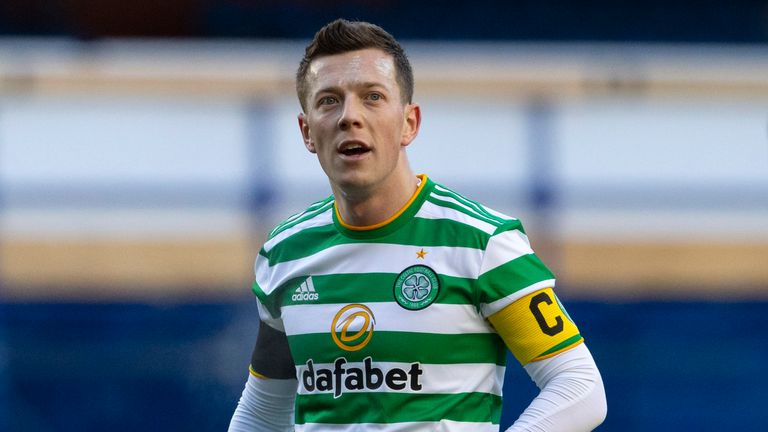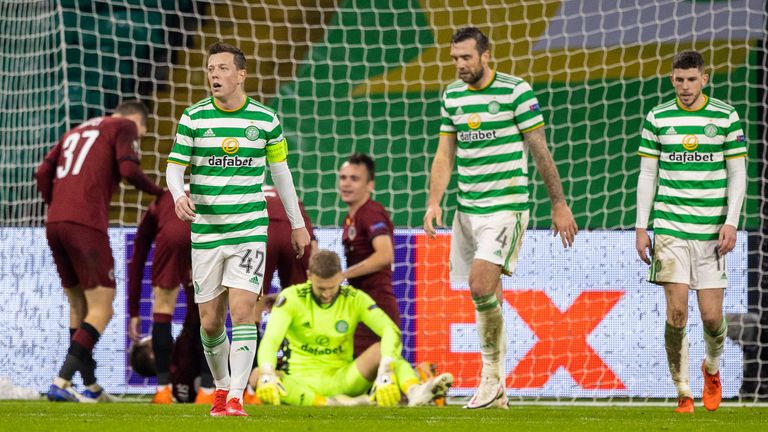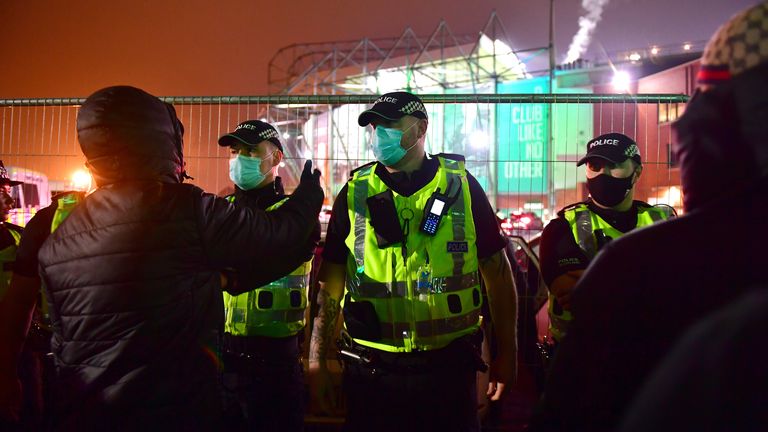Neil Lennon leaves Celtic: How can club rebuild after his resignation?
Neil Lennon led Celtic to the title last season but the Hoops have struggled to keep up with Rangers this term and he resigns with champions 18 points behind leaders; Celtic's defeat to Ross County on Sunday left Rangers just seven points away from title
Wednesday 24 February 2021 08:39, UK
In football, as in life, there is a sense of inevitably about most endings. Celtic's decline and fall from the summit of Scottish football was always likely to happen, but this season's collapse has taken place at an astonishing speed, in a way that would not have been scripted by most plot-writers.
A few months ago, Celtic were on the brink of a unique opportunity: to cap an extraordinary period of success by winning a record 10th successive Scottish league title, and in so doing, establish everlasting bragging rights over Rangers.
It seemed a sizeable, but manageable task. Despite the gradual improvements of Rangers under Steven Gerrard, over the last four years Celtic had been utterly dominant in domestic competition. Yet when cracks began to appear in the champions' seemingly unbreachable dam, it burst in spectacular fashion.
While Rangers have serenely glided their way swan-like through a - thus far - undefeated campaign on their way towards a first title in a decade, Celtic have floundered in their wake, at times thrashing around embarrassingly in a desperate attempt to salvage respectability from the season. While at times events conspired against them, ultimately it has been a self-inflicted sinking on the ill-fated voyage towards "The Ten".
Internal strife, poor decision-making, misfortune and basic errors have combined to signal the end of Celtic's league hegemony, and now the departure of manager Neil Lennon - so what lies ahead and what needs to be done differently to re-establish the club's position at the top of the Scottish game?
Trending
- Man Utd vs Bournemouth LIVE!
- Everton vs Chelsea LIVE!
- Wolves take on Leicester in Pereira's first game in charge LIVE!
- Juric in the stands as Southampton visit Fulham LIVE! & highlights
- Celtic held by stubborn Dundee Utd LIVE! & highlights
- World Darts Championship LIVE! Van Duijvenbode in action, Cullen to come
- Tottenham vs Liverpool preview: Slot offers Bradley & Konate updates
- Fury rages: I was robbed... Usyk got a Christmas gift!
- World Darts Championship schedule: Anderson headlines Sunday's action
- Transfer Centre LIVE! Could Maguire leave Man Utd for free next summer?
Football department strategy
At times during this season, Lennon resembled a deposed sea captain cast adrift by an unruly crew on an ocean of discontent. A club icon rendered powerless - after winning 21 trophies as player and manager, it was a sorry way for such a distinguished Celtic career to end.
In some ways his exit now is an act of mercy; the club's internal review into the team's poor performances instigated in December lasted more than two months, and as the title slipped from Celtic's grasp it appeared to be a matter of when, rather than if, Lennon would eventually relinquish the reins. The man who dug Celtic out of a hole when Brendan Rodgers left for Leicester had become a lame duck left bobbing in the water as his legacy deteriorated.
Normally so affable in his dealings with the media, in the final weeks Lennon understandably gave many pressing questions about the problems at the club short shrift, whilst at the time seeming to be almost bewildered by his team's failings. Almost exactly two years after returning to Celtic, Lennon has now left probably for the last time.
A shake-up of the football department now seems certain, but even during the spectacularly successful Rodgers era it was the source of much debate. During that period the manager worked alongside Lee Congerton to scout and sign talent, and though their recruitment record was decidedly mixed, Congerton eventually followed Rodgers to Leicester City.
Celtic are expected to create a new role of Sporting Director, but the club's current Head of Football Operations is Nick Hammond, the former Reading Director of Football and West Bromwich Albion Technical Director, who has established a close relationship with Lennon. It is unclear whether he will want to take the new role and work with Lennon's successor, or if he will have a say in the identity of the new head coach.
Hammond has been responsible for the identification of new players at Celtic over the last two seasons, with results again varied. While Jeremie Frimpong was bought for just £300,000 from Manchester City and sold to Bayer Leverkusen for more than £10,000,000, more expensive arrivals such as Patrik Klimala, Albian Ajeti and Shane Duffy have largely disappointed.
If, as suspected, incoming Chief Executive Dominic McKay refrains from the hands-on approach Peter Lawwell has traditionally taken to operations in the transfer market, those duties will fall the way of the Sporting Director - a role now filled successfully across the city at Rangers by Ross Wilson. Celtic's ability to scout the lower leagues in England and foreign markets for undiscovered bargains, a policy that has proved fruitful for many years, faces its biggest test yet.
It should be remembered that Celtic have been down the Sporting Director/Head Coach path before, with Kenny Dalglish and John Barnes - the legend and the rookie. That proved to be an unmitigated disaster, as Barnes was sacked halfway through his first season, and Dalglish guided a struggling team to the end of the campaign before Martin O'Neill arrived the following summer.
Question marks around John Kennedy's future also need answering. The former centre-half, whose career was cut short by injury, has long been touted from within by the club hierarchy as a potential Celtic manager, and was promoted to assistant when Lennon took over, but he is now tarnished with his association to this season's failings. He is now in interim charge, but will he stay on as part of the new coaching structure, or be cut adrift when the new man is appointed?
The buck for these unanswered questions will ultimately stop with majority shareholder Dermot Desmond, Lawwell and McKay, but any decision surely needs to be ratified quickly. McKay is not due to begin his new role until the start of July, shortly before Celtic's new season begins with the Champions' League qualifiers, which have become more hazardous with every passing year.
How much the new chief executive is involved in decision-making before then isn't certain, but a feeling that is rife amongst the support is that their club is treading water aimlessly until his arrival. Clarity and a vision for the way forward has not thus far been forthcoming - but Lennon's departure might speed up the process
Boardroom shake-up
Lawwell's announcement in January that he would be retiring at the end of this season was one of the most significant moments to occur in Scottish football since the financial demise of Rangers in 2012.
Lawwell's influence spread far beyond his office at Celtic Park; he will also leave behind a large vacuum at the Scottish FA and SPFL. He has been one of football's chief representatives in talks with the Scottish Government during the Covid-19 pandemic, as well as adding his weight over the years to discussions with TV companies over broadcasting contracts.
At Celtic, he has signed off every penny spent, and with a firm negotiating stance established the club as a prime location for young players to develop before they moved on to bigger leagues. Virgil van Dijk, Fraser Forster, Moussa Dembele and Frimpong are just four to have been sold for massive profit during Lawwell's tenure.
His successor looks like being a rather different chief executive. McKay's background is in communications and marketing, and in more than a decade at Murrayfield he has helped propel the SRU brand forward, latterly in his role as Chief Operating Officer.
The national rugby team has become one of the biggest success stories in Scottish sport, certainly off the field if not always on it; every Scotland game is a near 70,000 sell-out, while sponsorship deals abound and the organisation's turnover is now at more than £60m.
McKay will look to replicate this success at Celtic, but he is leaving the genteel bubble of rugby to join the argumentative chaotic world of football, where the day-to-day work of a club CEO is much more heavily scrutinised, especially in dealing with the media, agents and player contracts. With that in mind, as mentioned above, the Sporting Director appointment will be crucial.
Ultimately the real decision-maker at Celtic remains majority shareholder Dermot Desmond. He has often been decried as an absentee landlord; having been usurped by Rangers, how strong is his desire to restore Celtic to the top, and will he push the boat out financially once more to land a high-quality manager and rebuild the squad?
It was Desmond who persuaded Rodgers to move to Scottish football in 2016, just as it was he who drove the game-changing appointment of O'Neill two decades ago, both decisions made at a time when the club was on shaky ground. Another such moment has now arrived - it is vital for Celtic that Desmond acts boldly and decisively in the decisions he makes in the coming weeks.
Squad overhaul
Lennon's successor must reinvigorate a squad with some unhappy players, whom their manager had publicly called out earlier this season for expressing a desire to leave.
Frimpong and Olivier Ntcham got their wish in the January window; Odsonne Edouard and Kris Ajer could be the next to go in the summer, if the price proves good enough for Celtic to cash in. Scott Brown is a year closer to retirement, Ryan Christie's contract is running down with no sign he will extend it, and Callum McGregor is near the peak of his powers with suitors in England circling.

Gradual transition in terms of player turnover is the ideal aim for any successful club, but the squad that won an "invincible" treble in 2016-2017 could soon be completely dismantled. Only the ever-reliable James Forrest looks like a certain starter from that stellar team going into next season.
Celtic have three goalkeepers who have failed to shine, including one (Vasilis Barkas) who is threatening to be an expensive flop. The defence, which has been suspect all season, requires a total rebuild; Ajer is itching to move on, Christopher Jullien is recovering from serious injury and three loanees will depart. Greg Taylor could be a long-term answer at left-back but at least three additions look required to establish some stability.
Options are stronger in the centre of the park, where Ismaila Soro and David Turnbull have formed a positive young heartbeat for the future. McGregor's future is uncertain: if he stays and inherits the captaincy from Brown, he could lead Celtic for the rest of his career, but the feeling persists he is ready to test himself at a higher level.
Nir Bitton and Tom Rogic, both signed by Lennon in his first spell as manager, look ready for a fresh start, so midfield reinforcements must sought as well as in the wide areas, where loanee Mohamed Elyounoussi is expected to leave and Mikey Johnston is yet to make a major breakthrough.
In attack, Ajeti and Klimala need to prove quickly they can be reliable replacements for Edouard - otherwise major turnover must take place in this position as well. And what of Leigh Griffiths? A consistent goal-scorer when sharp, he has been unable to reach full fitness since the start of the pandemic; will he be required by the new regime?
European refocus
Celtic's fixation on achieving "10 in a row" has been to the detriment of the club's European ambitions. In 13 seasons under O'Neill, Gordon Strachan and during Lennon's first spell as manager, Celtic reached the Champions League group stages on eight occasions - and three times they progressed to the knockout stages. Since 2014, they've mixed with the elite of Europe just twice - under Rodgers - and failed to qualify both times.
Regression in Europe was perhaps inevitable due to the widening financial gulf between Celtic and Europe's top clubs; the days of Barcelona and Manchester Utd being toppled in the group stages are now consigned to history. That does not excuse Celtic from failing to beat teams with lesser budgets; Malmo, Maribor, AEK Athens, Cluj and Ferencvaros have all claimed the Scottish champions' scalp in qualifying in recent times.
Celtic Park's reputation as a fortress in European competition is now a distant memory. The club have suffered some embarrassing recent defeats at home, the nadir being a 4-1 reversal to Sparta Prague in this season's Europa League. While there have been some memorable European results, such as the 2019 double against Lazio, it has been a steady decline; Celtic's inability to invest in the squad at the right time to enable Champions League group stage participation has become a recurring fault.
Even more galling is the impressive record in continental competition established across the city by Steven Gerrard. In three seasons of Europa League competition, Rangers have won or drawn every of their qualifying matches, and lost just five of 42 European games in total, making the knockout stages in the last two seasons.
Scotland's co-efficient has skyrocketed since Gerrard's arrival, so much so that for the first time in more than a decade the top two in Scottish Premiership will both participate in the Champions League qualifiers. Celtic are fortunate to have this opportunity in front of them, ironically created by Rangers' improvements. The new manager will need to re-establish the club as a force on the continental stage, and not continue to settle for home comforts.
Supporter engagement
This has been a trying time for all football fans, locked out of grounds by the pandemic and denied their natural right to vent joy or frustration towards their teams. Celtic's demise on the pitch has taken place inside empty stadia, but that has not prevented some of their "supporters" from stealing the headlines.
The shocking scenes of violence in November outside Celtic Park after a defeat to Ross County laid bare the divisions between a vocal minority of the fanbase and the club's hierarchy. While some fans have protested in person, at times breaking Covid-19 protocols in the process, Lennon, Lawwell and Desmond have also been subject to increasingly vitriolic criticism on social media platforms.
The divide reached its zenith in the wake of the defeat to Rangers at New Year, when Celtic embarked on their ill-fated training camp to Dubai, just as Covid-19 restrictions tightened in Scotland. Fans were outraged at pictures of players and staff seemingly sunning themselves in the Middle East while the country suffered back home.
There is no doubt that the squad trained hard in the UAE - a place where title campaigns were re-energised in the previous two seasons - but government criticism, the subsequent positive cases that followed and the inability to accept mistakes had been made hardened the impression of a club that had become dangerously out of touch with reality.
McKay, a long-time Celtic season ticket holder, will acutely aware of the need to reconnect with the club's wider support, whilst maintaining a sense of order amongst the troublesome minority that have cost Celtic hundreds of thousands of Euros in fines from UEFA.
Selling 50,000 season books will be a major challenge, especially when the way forward has not yet been spelled out to the masses. The uptake and backing will come naturally if results improve out on the park, but supporters want to be treated with openness, honesty, and clarity - many believe that has not been forthcoming in recent months.
The obsession of reaching the fabled landmark of 10-in-a-row has held Celtic back; after a season like no other, perhaps now is the perfect moment for Celtic to reset as a club, and move forward with a more wholesome, less blinkered vision.
